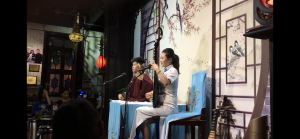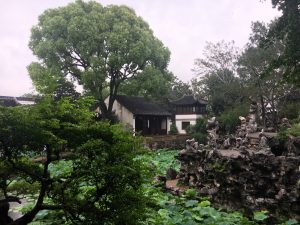At the end of June my Chinese course concluded and two weeks later I officially graduated from Beihang University. In addition to passing my university exams, I also recently passed the HSK 6 exam, which is the most advanced level of official Chinese exams for foreigners (comparable to the IELTS exam for english learners). Although I’ll miss attending daily Chinese classes, I’m also excited for the next stage of my life and I’m pleased with the progress I’ve made in learning Chinese over the past year. At the same time, I hope to continue improving my Chinese in the future and rather than not studying because I’m too busy with other commitments.
Having already graduated, I had some time in July to go travelling. Recently, I visited Suzhou, which is an ancient city near to Shanghai. Suzhou’s most famous tourist spots are its classical landscape gardens. The gardens I visited are the Humble Administrator’s Garden, the Lion Grove Garden and the Lingering Garden. These gardens are all exquisitely designed and very beautiful, walking through the gardens is very relaxing and a good way to experience China’s rich and ancient culture.

Pingtan
My favourite activity in Suzhou was going to watch pingtan one evening. Pingtan is a type of traditional folk music from Suzhou. I first became interested in Pingtan after watching a TV drama (都挺好)in which the main character often goes to watch Pingtan in a teahouse. After watching this show I was very keen to experience pingtan myself. Pingtan usually features two singers, the singer on the left hand side also plays a sanxian (a type of three stringed plucked instrument) and the singer on the right plays a pipa (a Chinese lute). The two performers sing and play together, with the songs mainly about ancient love stories and other folk legends. Pingtan is sung in the Suzhou dialect, which sounds very different to Mandarin Chinese, but although most people can’t understand the lyrics of pingtan, people still like to listen anyway.
The last place I visited in Suzhou was Suzhou museum. Suzhou museum is located in a very interesting building that was designed by the famous architect I.M. Pei. The museum design is a fusion of modern and ancient architecture together with Suzhou’s traditional landscape garden architecture. The museums holds a large collection of rare items, including many items from Wu State. Wu State is an ancient kingdom (existing from around the 12th century BC to 473 BC). It was located in the Suzhou area. Wu State had a very rich culture, which greatly influenced later culture in Suzhou. I think it was a great choice to visit the museum last, because having already visited a range of historical sites, I already had some awareness of the history and culture when I visited the museum, which allowed me to appreciate the design and contents of the museum better.

狮子林(Lion Grove Garden)
六月底我的中文课程结束了。除了通过我的大学北航的中文期末考试,我最近也通过了HSK六级(可以说是中国的雅思),六级是最高级的中文水平。即使我将来可能会想念每天上中文课的日子,我也为开始我下面的人生阶段而感到兴奋,而且我对自己这一年来的中文水平的进步很满意。与此同时,我希望我将来还能一直继续提高我的中文水平,而不是因为太忙而不继续学习中文。
因为已经毕业了,所以七月份我有了时间出去旅游一下。我最近到苏州去了,苏州是一个离上海很近的古老城市。苏州最有名的地方是其诸多苏州园林。我去的一些园林是拙政园、狮子林和留园,这些园林都是设计得很精致而且特别美丽的地方,在那边走走感觉很轻松,也能感受到中国丰富悠久的历史。
我在苏州的时候最喜欢的一项活动就是我到一个茶馆去听了评弹。我第一次了解评弹是因为电视剧《都挺好》里的苏大强经常去茶馆听评弹,我当时就很想去听评弹。评弹是一种传统的苏州民间音乐。弹词一般两人说唱,上手持三弦,下手抱琵琶,自弹自唱,内容多为儿女情长的传奇小说和民间故事。评弹的歌词大部分是苏州话,听起来跟普通话非常不一样。虽然大部分的人听不懂评弹的故事,但却因为苏州话很好听,人们还是喜欢去听。这让我不禁感叹中国各地的方言的复杂性。
我在苏州去的最后一个地方是苏州博物馆。苏州博物馆是一栋特别有意思的建筑,是著名建筑师贝聿铭设计的,是集现代化馆舍建筑、古建筑与创新山水园林的综合性博物馆。在苏州博物馆里有很多珍贵的东西,包括很多来自吴国的藏品。吴国是一个古老的国家(约公元前12世纪―公元前473年),大概位于中国苏州那一带,吴国有很丰富的文化内涵,而且吴国文化对后来的苏州文化的影响重大。我觉得最后去苏州博物馆是个很好的选择,因为我已经去过很多景区,了解了苏州的文化与历史,所以我去苏州博物馆的时候具备了一些对苏州文化的知识,因此在逛博物馆的时候更能感受到到苏州文化的美丽底蕴。
